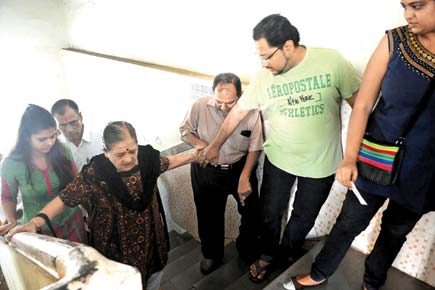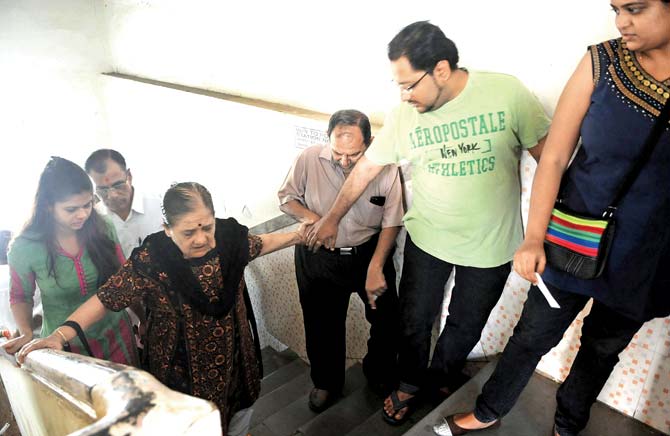Don’t let the government tell you it cares about everyone in this city. Millions of residents find it hard to step out of their homes daily

 My mother was born in Colaba over six decades ago. When I ask her what Bombay was like back then, she tells me that the politicians were fewer and seemingly nicer, electrical goods were sturdier, and the few roads our city had were surprisingly better. There were no supermarkets and few goods to choose from, she says, so people weren’t obsessed or even familiar with concepts like brands. They simply bought what was available and learned to like it.
My mother was born in Colaba over six decades ago. When I ask her what Bombay was like back then, she tells me that the politicians were fewer and seemingly nicer, electrical goods were sturdier, and the few roads our city had were surprisingly better. There were no supermarkets and few goods to choose from, she says, so people weren’t obsessed or even familiar with concepts like brands. They simply bought what was available and learned to like it.
 Senior citizens dread visiting government offices or going anywhere really, as most places don’t have special facilties for the elderly
Senior citizens dread visiting government offices or going anywhere really, as most places don’t have special facilties for the elderly
ADVERTISEMENT
She tells me that television sets were a luxury few could afford, telephones took decades to be delivered, and none of her neighbours owned cars, so she managed to spend much of her childhood climbing trees or playing in the many open spaces available to children like her. Even the celebrities were nicer, she adds, telling me about how she once met Shashi Kapoor at the lobby of the Taj hotel when she was around 10 years old. It happened to be his birthday, apparently, but he ended up giving her a large cake instead, because he liked her smile. She still adores Shashi Kapoor, and tells me she can’t visit movie theatres anymore because they don’t offer anything worth watching. I agree with her.
My mother moved to the suburbs before her teens, and tells me about the shoulder-high grass that used to stand where malls like InOrbit and Infiniti now cater to thousands of people daily. There were few streetlights, just a small number of single-storey homes spread out between kilometres of nothing but trees, and a serial killer called Raman Raghav on the loose, petrifying residents and compelling my mother to study for her Board examinations with the lights on, pausing every other minute to look at the door, imagining a stranger knocking.
She tells me about picnics to the beach, men and women gathering to dance or listen to jazz at clubs across South Bombay, big brass bands on weekends and how charming Bandra used to be during its annual fair, when young men and women from across the city would gather to mingle at formal dances. When I ask her what the bad things about Bombay were, she can’t seem to recall a thing.
These days, my mother avoids travelling unless she’s forced to. Her doctor has asked her to avoid getting into rickshaws or taxis because our roads tend to damage the spinal columns of senior citizens. She can’t take a bus because they are overcrowded, full of people who don’t care about women or children, and often stuck in traffic for hours. She dreads visiting government offices because most of them don’t have special facilities for people her age, or for pregnant women, or the disabled. Her last visit to a police station, for residential verification required by the passport office, ended with the policeman on duty asking her for a bribe.
My mother is part of a group of millions of people who simply don’t matter to the government of Maharashtra. Senior citizens struggle to cross our streets daily, dread stepping onto railway stations, stay away from public transport unless forced into it, and enter public hospitals only when they have run out of money to pay for private healthcare. Millions of them can’t afford to live in Bombay anymore, but stay on because they have nowhere else to go. We have reserved spots for them on paper, a pitiful seat or two on buses or trains, absolutely nothing at bus stops or railway stations, where they struggle to get from one platform to the next, buffeted by crowds of uncaring people too busy to stop because they have an office to get to.
Our government talks about bullet trains and the tallest statues on Earth, free Wi-Fi at railway stations and restaurants that will stay open all night. It says nothing about public health, open spaces for senior citizens, mandatory facilities for the disabled or more public toilets in a city that needs them desperately.
I tell my mother about new skywalks and malls that have appeared, about Bluetooth connectivity and the latest smart phones, learning apps and Netflix. Look at what we now have, I point out. Look at the limitless opportunities Bombay now offers hardworking young people. “What about the rest?” she counters. “The ones who don’t work anymore, the disabled and mentally ill, the ones who don’t matter to local politicians? Look at what we once had. Look at what we have lost.”
I have no reply to give her.
When he isn’t ranting about all things Mumbai, Lindsay Pereira can be almost sweet. He tweets @lindsaypereira. Send your feedback to mailbag@mid-day.com
 Subscribe today by clicking the link and stay updated with the latest news!" Click here!
Subscribe today by clicking the link and stay updated with the latest news!" Click here!







